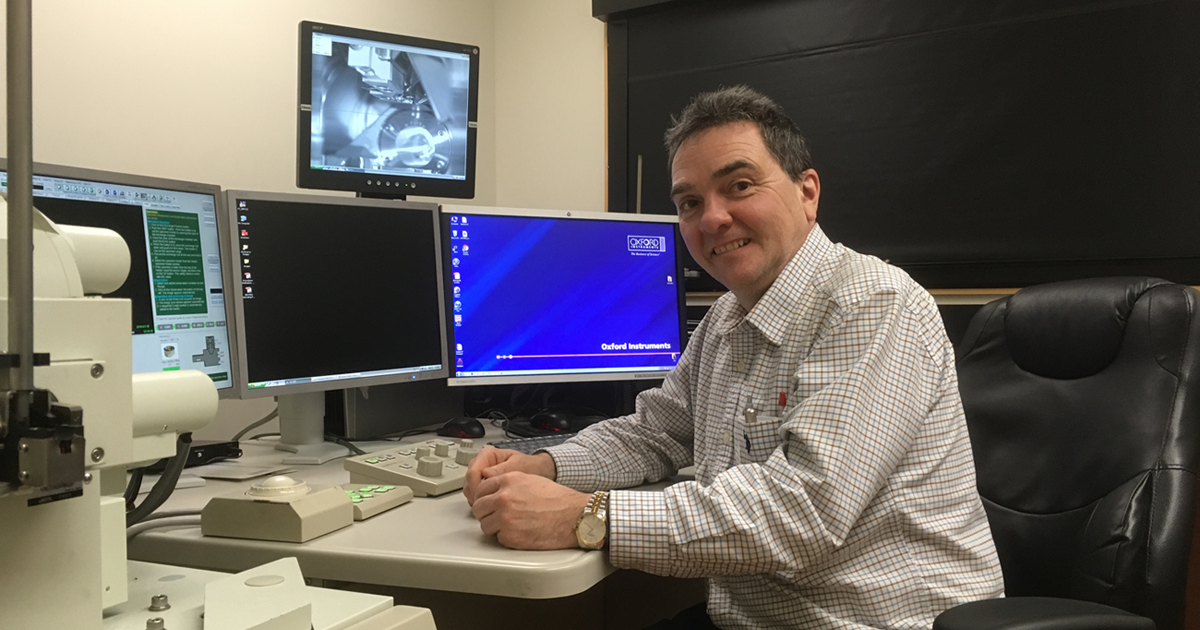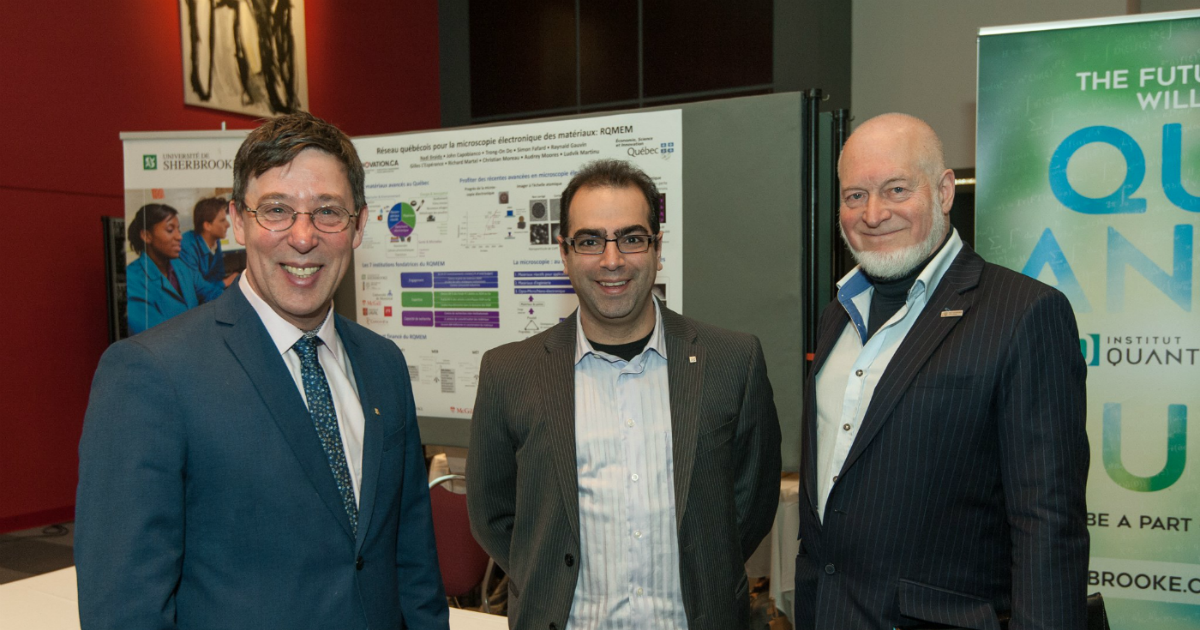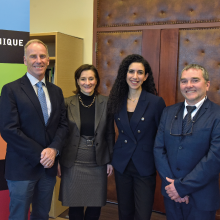Nouvelles
Québec Network for Electron Microscopy of Materials: Polytechnique Montréal and Université de Montréal awarded $15.2 million from the Canada Foundation for Innovation, Government of Québec and partners
Polytechnique Montréal, Université de Montréal and five other Québec universities will establish a distributed electron microscopy infrastructure for study of the properties of advanced materials, down to the atomic scale.
The Canada Foundation for Innovation, via its Innovation Fund, the Québec Ministry of Education and Higher Learning and various partners are providing a total of $29.2 million to the Québec Network for Electron Microscopy of Materials (known by its French abbreviation RQMEM, for Réseau québécois de microscopie électronique des matériaux), an infrastructure consisting of electron microscopes and other high-performance Instruments to be used to analyze structures of advanced materials.
Established by Polytechnique Montréal, Université de Montréal, Université de Sherbrooke, École de technologie supérieure, Concordia University, Université Laval and McGill University, the RQMEM will be headed by Nadi Braidy, an associate professor in the Department of Chemical Engineering and Biotechnology at Université de Sherbrooke. The network will use, among other techniques, transmission electron microscopy, whereby a beam of electrons is transmitted through an ultrathin sample of material, allowing researchers to extract key elements for analyzing its structure. Those elements will enable study of the morphology, nature and composition of chemical bonds down to the atomic scale.
The RQMEM’s distributed infrastructure will be used by more than 250 academic researchers and some 150 industrial researchers at the participating institutions. The instruments will serve research projects grouped into four broad areas: engineering materials, nanoparticles and reactive materials for green technologies, opto-, micro- and nanoelectronic materials, and advanced metrological development in electron microscopy.
“Our government understands that scientists need to have the best labs and tools if they're going to make discoveries that will pave the way to a brighter future for all people,” says the Honourable Kirsty Duncan, Minister of Science, Government of Canada. “That's why this funding announcement is so important; it gives scientists and their students the opportunity to further their research in areas where Canada has a competitive advantage. The discoveries, innovations and skills developed in these new, state-of-the-art labs will go a long way in improving our lives, our economy and our future prosperity.”
“More than ever, the quality of research infrastructure contributes to the recruitment and retention of researchers, an important condition for training young researchers and highly qualified personnel and an essential component in the competitiveness of Québec’s research institutions,” notes Hélène David, Minister of Higher Education and Minister responsible for the Status of Women, Government of Québec. “It’s therefore even more important to invest in this infrastructure for Québec to remain competitive both nationally and internationally.”
Dominique Anglade, Deputy Premier, Minister of Economy, Science and Innovation, and Minister responsible for the Digital Strategy, Government of Québec, emphasizes: “One of the goals of the 2017–2022 Québec Research and Innovation Strategy is to support researchers and innovators in fostering the cross-fertilization of ideas, to invest in collaborative research and innovative projects, and to ensure access to competitive infrastructure and its financing.” She continues: “We are supporting partnerships and knowledge transfer among players in the research and innovation ecosystem, two inseparable components of Québec's economic development. Our co-financing of CFI Innovation Fund projects falls squarely within these goals.”
Leading-edge infrastructure for electron microscopy
Under the RQMEM project, Polytechnique Montréal and Université de Montréal have been awarded more than $15 million for installation of leading-edge microscopy instrumentation at the Centre for Characterization and Microscopy of Materials (CM)2, a laboratory directed by Professor Gilles L’Espérance of the Department of Mathematical and Industrial Engineering at Polytechnique.
Those instruments are a double-aberration-correction transmission electron microscope, a scanning electron microscope equipped with a sample stage, and a focused ion beam system. The funding from the governments of Canada and Québec will also go toward construction and renovation of laboratory rooms, infrastructure development and installation, and instrument maintenance.
“The RQMEM is a network of seven institutions, each of which already has considerable expertise in microscopic-scale characterization of materials,” explains Professor L’Espérance. “The initial benefit of this pooling of expertise is that facilities across Québec will be equipped with unique Instruments for research: leading-edge instruments that, for the first time, will enable local researchers to conduct work that until now could only be done in Europe, the U.S., or at the Canadian Centre for Electron Microscopy at McMaster University in Ontario.”
He adds: “A second benefit is that the expertise associated with these instruments will be complementary, so the network will be of great benefit to the work currently being conducted in materials engineering and science at the participating university institutions. We are therefore creating synergy among researchers right across Québec via the RQMEM, which will be an open platform.”
The double-aberration-correction transmission electron microscope to be installed at (CM)2 will deliver unparalleled imaging resolution for the study of the physical aspects of materials. The scanning electron microscope, meanwhile, will be used for spectroscopic analysis in the study of the materials’ chemical aspects, including for in operando observation of materials used to manufacture batteries. The focused ion beam system, the only one of its kind in Québec, will enable reconstruction and imaging of the 3D structure and chemical structure of the materials under study.
According to Professor L’Espérance, the RQMEM node under the responsibility of Polytechnique Montréal and Université de Montréal will generate benefits for researchers on the campus working on production of advanced materials, as well as those interested in processes for implementing them in industry.
“For a material to be usable, it must have characteristics and properties dependent on its nano/microstructure, which in turn is dependent on the material’s manufacturing process,” he explains.
The RQMEM instruments that will used at the (CM)2 will be designed and manufactured to the exacting specifications of Polytechnique Montréal and Université de Montréal. The process of evaluating, selecting and installing them is expected to take between one and three years.

Gilles L’Espérance, Professor of Mathematical and Industrial Engineering and Director of the Centre for Characterization and Microscopy of Materials (CM)2, Polytechnique Montréal.

Left to right: Jean-Pierre Perreault, Vice-Rector, Research and Graduate Studies and Professor of Biochemistry, Université de Sherbrooke; Nadi Braidy, Associate Professor of Chemical Engineering and Biotechnology, Université de Sherbrooke and Director of the Québec Network for Electron Microscopy of Materials (RQMEM); Augustin Brais, Associate Director and Development Director – Partnerships and Research Infrastructure, Research, Innovation and International Affairs Directorate, Polytechnique Montréal (representing Professor Gilles L’Espérance). (Photo: Université de Sherbrooke)
To learn more
Expertise profile of professor Gilles L’Espérance
Expertise profile of the Centre for Characterization and Microscopy of Materials (CM)2, Polytechnique Montréal
Website of the Department of Mathematical and Industrial Engineering, Polytechnique Montréal (In French)
Website of the Canada Foundation for Innovation




